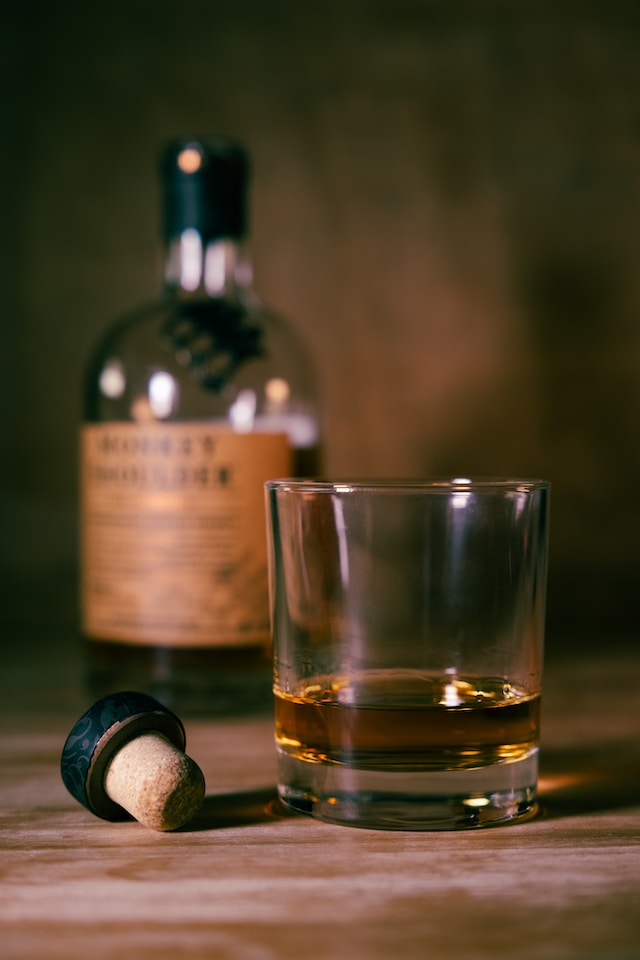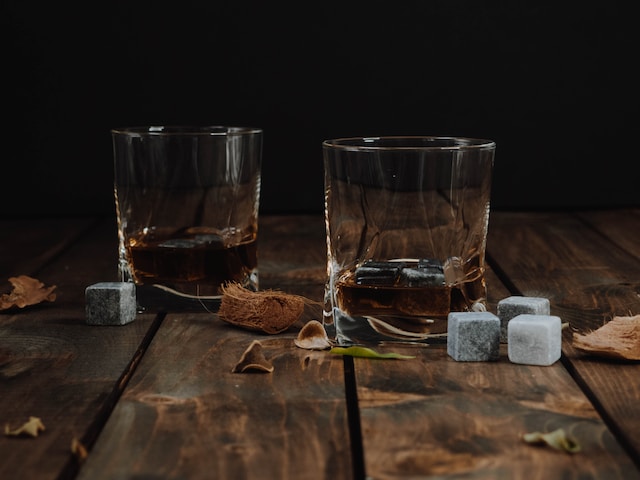Many factors can influence the strength of whiskey. These include distillation and ageing processes, as well as how much alcohol evaporates during storage, which decreases its strength.
Cask-strength whisky refers to whisky that has not been watered down prior to bottling. This can reach 130 proof and should typically be enjoyed sipped alongside water. To check out how strong each whiskey type is then read below.

Scotch
When selecting a Scotch whisky to purchase or make at home, there are numerous aspects to take into account, from barrel type and alcohol content to how the spirit is labelled, including composition (single malt or blended) and the origin of the distillery, as well as an age statement that details its ageing process.
Single malt Scotch whiskies are produced and aged at the same distillery and typically have higher alcohol contents than blended Scotches, often reaching up to 43% alcohol by volume in some premium bottles. Furthermore, unlike blended whiskies, which may have had their alcohol reduced prior to ageing in barrels, a single malt has never been watered down prior to barrel maturation.
An effective way to experience the full flavour of single malt whiskies is by drinking them at their natural alcohol strength. This allows you to fully appreciate their aromas and flavours, which may be enhanced further by adding drops of water or even ice cubes to your glass and slowly melting.
Kilchoman Original Cask Strength whisky from Scotland’s Islay region offers an ideal starting point for the world of high-proof Scotch, boasting rich notes such as raisins soaked with alcohol, ginger, and caramel with an exquisite smoothness that makes for an easy drinker’s introduction to Scotch whisky. Or alternatively, try one of The Macallan’s more luxurious permanent expressions, such as the Oloroso-seasoned Double Cask; though not cheap, it makes an enjoyable nightcap by the fireside or alone in front of a good book.
Bourbon
Bourbon whisky is an American spirit distilled from grain-based alcohols such as corn or wheat, though barley and rye may also be included in its base ingredients. Master distillers begin by selecting an optimal mix of grains to use and milling them prior to mixing with water and heating the mash so that enzymes can convert starches into fermentable sugars for fermentation. After cooking the mash, yeast is added to begin fermentation and the resultant liquid is distilled to between 80% and 90% alcohol by volume. Once completed, it’s placed in barrels for at least four years of ageing to change colour and flavour due to interaction between its chemical constituents and the charred wood barrel. Sometimes additional casks may be added for finishing purposes or to provide new flavours altogether.
Bourbon must enter its barrel at a minimum proof of 125 and can be diluted with up to 20% water before bottling for sale. While traditional 80-proof is the norm for sale, many distillers offer barrel-proof or cask-strength expressions of their product.
Bourbon differs from other spirits by not allowing extra ingredients like fruit and spices to be added during production, meaning flavoured bourbons should technically be classified as liqueurs rather than true bourbon, despite being popular choices for cocktails.
Popular bourbon brands often include premium labels that produce large volumes. These bourbons tend to have higher proof levels than what can be found at local liquor stores, making them perfect for sipping. Small-scale producers may produce higher-grade premium spirits with more reasonable pricing by creating small batch releases of product blending hundreds or thousands of barrels to achieve consistency.
Irish
Irish whisky is an emerging category impacting the whiskey industry in the US and whiskey tourism in Ireland. According to figures from Drizly for 2022, Irish holds an 8.4 percent share of overall whisky subcategory sales—not only this month but every March too! It sees seasonal spikes.
Irish whisky comes in various varieties, such as single malt, grain, and blends. Each has their own specific mashbill and distillation process but their tastes tend to be comparable. Most bottles reach 40 percent alcohol by volume (ABV or 80 proof), although some even reach up to 120 proof.
Glendalough Whisky was aged for seven years in both bourbon and sherry casks before finishing in mizunara oak to produce this smooth and delectable single malt that offers vanilla, dark fruit, and sherried nuts flavours with subtle sherried nuts notes; it makes an excellent cocktail whisky as well.
Writers Tears Copper Pot whisky offers those looking for something a bit spicy in their whisky an alternative option, made up of pot still and single malt whisky blended at high proof and bottled to meet demand from Peaky Blinders fans.
Though Irish whisky blends are less frequently enjoyed than Scotch or Bourbon, there are a few tasty varieties worth trying. Walsh Whisky produces The Writers Tears as one such blend that’s worth your while; aged in ex-bourbon barrels before bottling at a high proof level for easy sipping. You can find this whisky at many retail locations or directly through Walsh Whisky online.
Tennessee
Tennessee whiskies have become increasingly popular on the market. Renowned brands like Jack Daniel’s and George Dickel are offering single barrel and high-proof expressions, offering something suitable for every palate and setting, whether that means taking it straight up with soda or sipping in shots with food! There’s sure to be one perfect for you in Tennessee.
Tennessee whiskies provide more flexibility in terms of mash bill variety. State laws mandate at least 51 percent corn content, while wheat, barley, or rye can make up any remaining part of their blends. Furthermore, Tennessee regulations prohibit distilling whisky exceeding an 80 percent alcohol by volume limit for bottling purposes.
Tennessee bourbons are known for their smoothness and mellow taste, thanks to Lincoln County’s process of filtering spirits through sugar maple charcoal filters. These filters help create their signature flavour profile as well as provide sweetness with Corsair Triple Smoke’s unique smoke flavour and smooth finish.
Uncle Nearest Bourbon, produced pre-prohibition whiskey resurrected by great-great-grandsons of its original makers using family recipes, is another local whiskey made in Maryland and available locally. Filtered through sugar maple charcoal for filtering purposes and aged in charred oak barrels, its subtle sweet flavours include caramel apples, cinnamon sugar, vanilla bean, and charred oak aromas and flavours.
Sweetens Cove Bourbon from Tennessee is another outstanding bourbon offering, boasting 101.4 proof and an exquisite array of aromas like green apple, butterscotch, brown sugar, and cream soda. Its smooth and mellow palate also includes leather, cedar, chocolate cake, and vanilla notes.
Rye
Rye whisky is the most beloved spirit in America. With a high alcohol content and spicy spice notes, its popularity makes it ideal for cocktails such as Manhattans or Old Fashioneds. Rye whisky also comes in different flavours, ranging from smooth and sweet to bitter and sharp, many of which are aged in oak barrels, which add depth of flavor. Quality depends upon its mash bill composition, blending process, and ageing process; additionally, it must contain at least 40% ethanol by volume (ABV). When selecting one, it is wise to choose an older, more reliable brand; cheaper options may not give the desired results.
Some rye whiskies are double-finished. This means they are bottled after being finished in an oak barrel previously used to age another spirit, such as wine, fortified sherry, or even Jamaican or Barbadian rum barrels. This technique is particularly common with rye whisky; in fact, some distillers even finish theirs using casks originally intended for wine or sherry production! This technique is particularly favoured among rye distillers; in fact, some even finish it using casks from another spirit, making its flavour even stronger! This technique makes its mark.
Old Overholt Rye Whisky was once one of the most renowned whiskies after Prohibition. It offers an ideal balance of cereal sweetness, vanilla bean notes, and peppery spice with great value as a mix-in option for cocktails.
Other popular rye whiskies include Booker’s Rye, produced by the late master distiller Booker Noe and featuring bold spices such as cinnamon and citrus zest; its high proof content justifies its higher price point. If you prefer less expensive spirits, check out Willett 4-Year Straight Rye; it can be enjoyed either alone or as part of classic cocktails!
